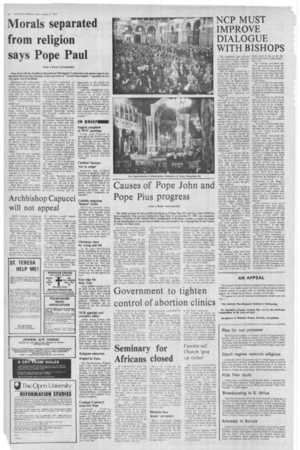Page 2, 3rd January 1975
Page 2

Report an error
Noticed an error on this page?If you've noticed an error in this article please click here to report it.
Tags
Share
Related articles
Letters
Memo To Mgr Bruce Kent: Stop Sniping At Ncp
Back To Reality
Conference Puts Priests' Welfare First
Ncp And Bishops On Diocesan Boundaries
NCP MUST IMPROVE DIALOGUE WITH BISHOPS
The credibility and survival of the four-year-old National Conference of Priests depends on improving dialogue with the bishops, which has so far proved disappointing.
This is clearly stated in a letter from the standing corn mittee of the NCP to the secretary of the Bishops' Conference of England and Wales, replying to his letter containing the Bishops' responses (Catholic Herald, December 6) to the NCP's resolutions passed in September. The, priests expressed themselves "most disap pointed" at the reception of their suggestions on consultation and regret that no procedure for arbitration in dis putes between a bishop and a priest has yet been introduced. The NCP resolutions on consultation asked that it should, among other things, be ade quately publicised, the views expressed given fair con sideration, all relevant informa tion made available and where possible reasons should be given for the decision finally taken. The priests described the bishops' answer, which neither accepted nor rejected the principles of consultation suggested, as "vague and indeterminate," "As a result, we are still left without an accepted criterion or yardstick by which consultation can be measured," the NCP said. Consultation has most often been discussed in relation to the selection of bishops, but the Second Vatican Council has recommended it should cover all major pastoral matters. The NCP asked the bishops directly in their reply whether they accept the principles outlined.
The NCP asked the bishops to use their influence to speed up the promulgation of the Roman Conciliation Procedure to provide arbitration in disputes between an individual priest and his bishop, called "Due Process." The original NCP resolution had expressed "disappointment and frustration at the inability of those concerned to produce a final acceptable procedure" after four years' negotiations.
The NCP said it "learned with some surprise" from the bishops that the arbitration procedure originally prepared at their request by the Canon Law Society "is available for possible use in cases which are suitable." They ask the bishops to make clear where it can apply. At present a priest suspended by his bishop is without right of appeal within his diocese..
The priests agree that while the principles of the report "Co-responsibility and the Clergy," produced by a joint working party of priests and bishops, are being implemented in some dioceses, as the bishops note, this is not true of all. "In sonic areas it has to be discussed, let alone implemented," they said.
The bishops commend the NCP resolution that priests be specially trained to help lay adult Christian formation, helping the laity recognise their own particular role and not see themselves simply as auxiliaries of the priest.
The NCP note this, but state: "There is a limit to what even the most enthusiastic priest can accomplish so long as the laity themselves remain unconvinced of their role.
"The machinery by which the laity can play their full part in the mission of the Church does not yet seem to be available.
There is talk of the laity being consulted on this and that, but the ways in which they can
make their views known except in the case of a small proportion — does not seem to exist in practice.
"It is also unfortunately true that there is much cynicism amongst the laity as to the extent their views receive any attention at all."
The priests welcomed the bishops' decision to recommend that the NCP he represented on the Groundplan Committee, which is reviewing diocesan boundaries and has suggested the number of dioceses in England and Wales be almost doubled. The NCP said they appreciated the difficulties in finding a retirement age for priests and in implementing a national sickness and retirement benefit scheme, which the NCP had discussed.
The NCP deny that improvements in procedure would overcome the divisions of opinion expressed at the Conference, as the Bishops' letter suggests. The issue which received most publicity was contraception, one priest admitting that many priests took decisions in confession that they would be unprepared to state publicly before their bishops. The T priests said such differences were more deepseated and ultimately derived from the apparent lack of positive response from the bishops to the NCP. The bishops, by continually ignoring or being indifferent to the NCP's views, "could destroy the Conference." It was vital that "the dialogue with the bishops should be improved in a visible and effective manner."
The executive committee of the NCP, whose Conference represents all the secular clergy of England and Wales elected on an age group basis, concluded their letter by saying that they had been frank. It was only thus that they could "develop the spirit of trust and generosity between bishops and priests to which you refer in your letter, and so make effective and fruitful the discussion between us in accordance with the ideals and teachings of Vatican 2."
blog comments powered by Disqus









